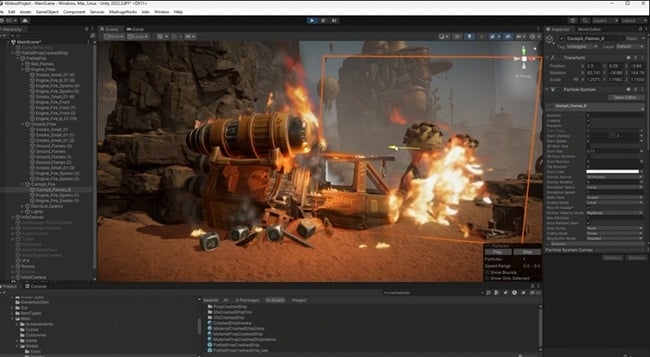
Duration 4h 6m Project Files Included MP4
Creating Realistic VFX In The Unity Game Engine
Info:
What you’ll learn
Solid Unity VFX fundimentals such as particle emission types and shader/material properties
How to implement physics, animation, bones and cloth simulation in Unity
Powerful techniques such as scrolling UVs, trail particles, sub-emitters and light particles
How to implement Unity C# scipting to control VFX
Use Embergen and Adobe Premiere to create and improve your texturesheets (flipbooks)
The compete process of creating VFX from beginning to end (three extensive examples)
This course covers the many aspects of creating compelling, realistic VFX in Unity. It covers a broad range of topics that will provide you with a solid understanding of the tools and processes involved in creating performant real-time visuals.
Designed for beginners or intermediates in mind (with many tips and tricks for the more experienced), all of the fundemetnal areas of VFX are explored, equipping you with the tools and knowledge for you to create your own awesome VFX!
12 of the chapters come with Unity scenes designed so you can follow along with a lesson; these include any required resources such as textures, materials, models etc. Use Unity 2021.3.2 or newer using the built-in render pipeline, although the Boat Wake tutorial contains an additional 2023.2 HDRP version (used in the course preview image). These are often modified versions of assets that I sell on Unity Asset Store (totalling $100 in value).
The course is divided into three main sections:
Section 1
A comprehensive look at texturesheets (often referred to as flipbooks) which are an invaluable resource when creating realistic VFX; by essentially bringing a short video clip into your game, your VFX can immediately benefit from the photorealism of that footage.
Several of the chapters will focus on modifying and improving video clips that are to be used as texturesheets using Adobe Premiere (although any equivalent editing package could be used), with lots of advice on cleaning up, formatting, improving motion and seamlessly looping video clips.
Several chapters also take a look at Embergen (an invaluable tool in creating Texturesheets), with tutorials including creating looping simulations and using reference geometry.
There’s several Unity specific chapters in this section too, with tips such as holding the last frame of a texturesheet and many ways to hide repeats when using multiple texturesheets in a particle system.
Section 2
This section focuses primarily on Unity itself, looking at the many methods you can approach the creation of VFX.
It begins with the basics, starting with the various particle emission types and particle shader settings.
Then there’s collision and sub-emitters, using lighting particles and animation, starting with a simple setup, then moving onto advanced animation control with scripting.
Next, we’ll at Unity’s cloth simulation, followed by how trail particles can be implemented.
Scrolling the UVs of a mesh can produce some great effects so we’ll take a look at this, then we’ll combine this technique with animated joints to create a very fun wormhole effect.
We’ll end with a deep dive into the various ways to implement physics into your VFX, including physics within a particle system, physics controlled via scripting and pre-baked simulations.
Section 3
In this section we’ll create three bespoke particle systems from beginning to end, utilising many of the techniques learnt on this course.
We’ll create a rain simulation, compete with rain drops, ground splashes and ground water.
Next, we’ll create a bullet trails underwater effect
Finally, we’ll create a series of effects for a boat moving through water, with a wake at its sides and rear, water foam at its edges and lots of spraying water.
Who this course is for:
This course is those at a beginner or intermediate level of Unity, although more advanced users will likely find the course useful too
Password/解压密码www.tbtos.com
转载请注明:0daytown » Creating Realistic VFX In The Unity Game Engine